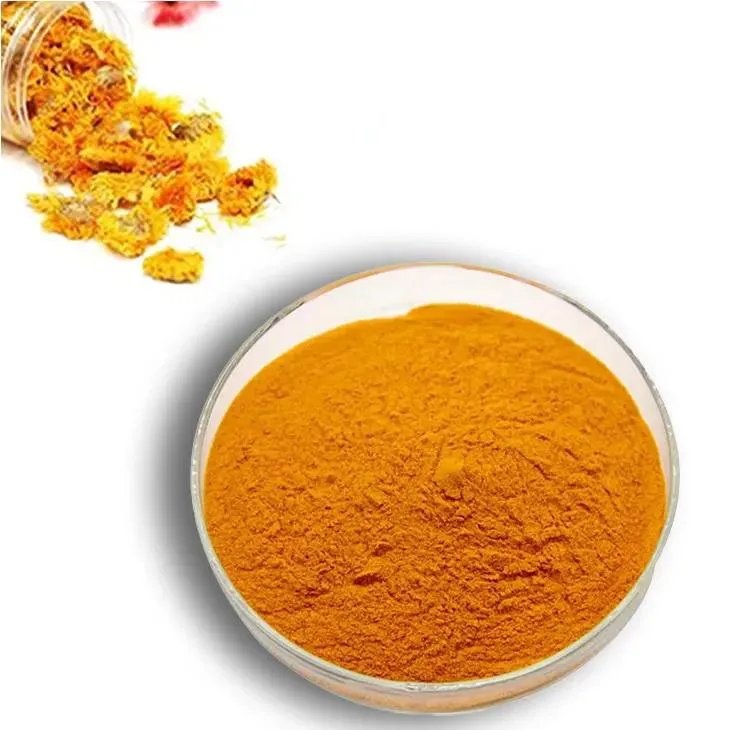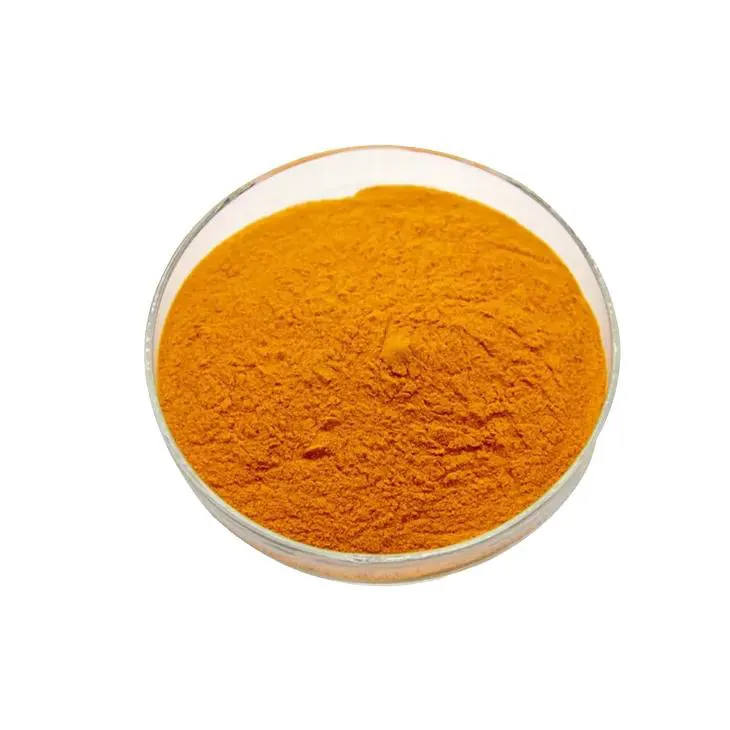- 0086-571-85302990
- sales@greenskybio.com
Is marigold extract beneficial for diabetes? Are these all safe and suitable for diabetic patients?
2024-11-14

1. Introduction
Diabetes has become a global health concern, affecting millions of people worldwide. As a result, there is a growing interest in finding natural remedies that can help manage the condition. Marigold Extract has recently emerged as a potential candidate in this regard. However, it is crucial to understand its effects on diabetes and its safety for diabetic patients. This article aims to provide an in - depth analysis of Marigold Extract from various aspects, including its chemical constituents, potential impact on diabetes - related factors, and overall safety and applicability for those with diabetes.

2. Chemical Constituents of Marigold Extract
Marigold extract contains a variety of chemical compounds, some of which may have implications for diabetes management. Flavonoids are one of the major components. These are known for their antioxidant properties. For example, Quercetin, a type of flavonoid found in marigold, has been shown in some studies to have anti - inflammatory effects. Inflammation is often associated with diabetes and its complications.
Another important group of compounds in marigold extract is carotenoids. Lutein and zeaxanthin are two well - known carotenoids present. These compounds play a role in maintaining eye health, which is especially relevant for diabetic patients who are at a higher risk of developing eye problems such as diabetic retinopathy.

3. Potential Impact on Diabetes - related Factors
3.1 Blood Glucose Regulation
Some studies suggest that certain components of marigold extract may influence blood glucose levels. The antioxidant properties of flavonoids could potentially help reduce oxidative stress in cells, which is often disrupted in diabetes. By reducing oxidative stress, it may improve insulin sensitivity. Insulin is crucial for regulating blood glucose, and improved sensitivity can lead to better blood glucose control. However, more research is needed to establish a clear causal relationship between marigold extract consumption and blood glucose regulation in diabetic patients.
3.2 Lipid Metabolism
Abnormal lipid metabolism is common in diabetes. Marigold extract may also have an impact on lipid levels. The carotenoids in the extract could potentially affect lipid metabolism by interacting with lipid - related enzymes or receptors. For instance, they may help reduce the levels of triglycerides and low - density lipoprotein (LDL) cholesterol, while increasing high - density lipoprotein (HDL) cholesterol. This could be beneficial in reducing the risk of cardiovascular complications, which are a major concern for diabetic patients.

4. Safety of Marigold Extract for Diabetic Patients
4.1 General Safety Considerations
Marigold extract is generally considered safe when consumed in moderation. However, some people may be allergic to marigolds, and this can lead to allergic reactions such as skin rashes, itching, or respiratory problems. Diabetic patients who are considering using marigold extract should be aware of this risk and, if possible, undergo an allergy test before starting supplementation.
4.2 Interaction with Medications
One important aspect of safety for diabetic patients is the potential for interaction with medications. Diabetic medications are carefully prescribed to manage blood glucose levels, and any interaction with other substances can disrupt this balance. Marigold extract may interact with certain medications, such as blood - thinning drugs. For example, if a diabetic patient is taking warfarin and also consumes marigold extract, there could be an increased risk of bleeding. It is essential for diabetic patients to consult their healthcare provider before adding marigold extract to their regimen to avoid any potential adverse drug interactions.

5. Applicability for Diabetic Patients
5.1 Dietary Considerations
For diabetic patients, diet plays a crucial role in managing the condition. Marigold extract can be incorporated into the diet in various ways. It can be consumed as a supplement in the form of capsules or tablets, or it can be added to food. For example, marigold petals can be used to make herbal teas or added to salads for a touch of flavor and potential health benefits. However, it is important to note that marigold extract should not be considered a substitute for a well - balanced diet and appropriate medical treatment.
5.2 Lifestyle and Overall Health Management
Diabetes management is not just about controlling blood glucose levels but also about maintaining overall health. Incorporating marigold extract into a healthy lifestyle that includes regular exercise, stress management, and proper sleep can potentially enhance its benefits. For example, exercise can improve insulin sensitivity, and the antioxidant effects of marigold extract can complement this by reducing oxidative stress. However, again, it is important to approach marigold extract as a complementary measure rather than a sole solution for diabetes management.
6. Conclusion
In conclusion, marigold extract contains various chemical constituents that may have potential benefits for diabetes management, such as influencing blood glucose regulation and lipid metabolism. However, its safety for diabetic patients is not without considerations. There are potential allergy risks and possible interactions with medications. Diabetic patients should approach marigold extract with caution and consult their healthcare provider before using it. While it may have a place in a comprehensive approach to diabetes management, it should not replace conventional medical treatment and a healthy lifestyle. More research is also needed to fully understand the extent of its benefits and potential risks in the context of diabetes.
FAQ:
What are the main chemical constituents in marigold extract?
Marigold extract contains various chemical constituents. One of the main ones is flavonoids, which have antioxidant properties. It also contains carotenoids, such as lutein and zeaxanthin. These components may play different roles in biological processes.
How could marigold extract potentially affect blood sugar levels?
Some of the components in marigold extract, like certain flavonoids, might influence the body's insulin sensitivity. By improving insulin sensitivity, it could potentially help the body better regulate blood sugar levels. However, more research is needed to fully understand the exact mechanisms and the extent of its impact on blood sugar.
Are there any potential side effects of marigold extract for diabetic patients?
While marigold extract is generally considered safe in normal amounts, some people may be allergic to it. In diabetic patients, it's also important to note that if it interacts with diabetes medications, it could potentially cause unexpected effects. For example, it might enhance or interfere with the action of medications that lower blood sugar, so it should be used with caution.
Can marigold extract replace diabetes medications?
No, marigold extract cannot replace diabetes medications. Diabetes medications are specifically designed to control blood sugar levels through well - studied mechanisms. Marigold extract may have some potential benefits related to diabetes, but at present, it is not a substitute for traditional medical treatment. Diabetic patients should always follow their doctor's advice regarding medication use.
How should diabetic patients use marigold extract if they want to try it?
If diabetic patients want to try marigold extract, they should first consult their doctor. The doctor can assess their overall health, including any potential interactions with existing medications. They should also start with a small amount to see if there are any adverse reactions. It's important to monitor blood sugar levels closely during this time.
Related literature
- The Potential Role of Marigold Extract in Diabetes Management"
- "Chemical Constituents of Marigold and Their Impact on Diabetic Factors"
- "Safety and Efficacy of Marigold Extract in Diabetic Patients: A Review"
- ▶ Hesperidin
- ▶ Citrus Bioflavonoids
- ▶ Plant Extract
- ▶ lycopene
- ▶ Diosmin
- ▶ Grape seed extract
- ▶ Sea buckthorn Juice Powder
- ▶ Fruit Juice Powder
- ▶ Hops Extract
- ▶ Artichoke Extract
- ▶ Mushroom extract
- ▶ Astaxanthin
- ▶ Green Tea Extract
- ▶ Curcumin
- ▶ Horse Chestnut Extract
- ▶ Other Product
- ▶ Boswellia Serrata Extract
- ▶ Resveratrol
- ▶ Marigold Extract
- ▶ Grape Leaf Extract
- ▶ New Product
- ▶ Aminolevulinic acid
- ▶ Cranberry Extract
- ▶ Red Yeast Rice
- ▶ Red Wine Extract
-
Jujube Extract
2024-11-14
-
Plantain extract
2024-11-14
-
Tormentil Extract
2024-11-14
-
Citrus Aurantii Extract
2024-11-14
-
Oyster Mushroom Extract Powder
2024-11-14
-
Cat Claw Extract
2024-11-14
-
Soy Extract
2024-11-14
-
Mangosteen extract powder
2024-11-14
-
Lavender Extract
2024-11-14
-
Acerola Juice Powder
2024-11-14





















